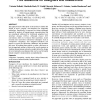Free Online Productivity Tools
i2Speak
i2Symbol
i2OCR
iTex2Img
iWeb2Print
iWeb2Shot
i2Type
iPdf2Split
iPdf2Merge
i2Bopomofo
i2Arabic
i2Style
i2Image
i2PDF
iLatex2Rtf
Sci2ools
116
click to vote
CHI
2002
ACM
2002
ACM
Making sense of sensing systems: five questions for designers and researchers
This paper borrows ideas from social science to inform the design of novel "sensing" user-interfaces for computing technology. Specifically, we present five design challenges inspired by analysis of human-human communication that are mundanely addressed by traditional graphical user interface designs (GUIs). Although classic GUI conventions allow us to finesse these questions, recent research into innovative interaction techniques such as `Ubiquitous Computing' and `Tangible Interfaces' has begun to expose the interaction challenges and problems they pose. By making them explicit we open a discourse on how an approach similar to that used by social scientists in studying human-human interaction might inform the design of novel interaction mechanisms that can be used to handle human-computer communication accomplishments. Keywords Ubiquitous Computing, sensing input, design framework, social science, human-machine communication.
CHI 2002 | Human Computer Interaction | Human-human Interaction | Innovative Interaction Techniques | Keywords Ubiquitous Computing |
Related Content
| Added | 01 Dec 2009 |
| Updated | 01 Dec 2009 |
| Type | Conference |
| Year | 2002 |
| Where | CHI |
| Authors | Victoria Bellotti, Maribeth Back, W. Keith Edwards, Rebecca E. Grinter, D. Austin Henderson Jr., Cristina Videira Lopes |
Comments (0)

